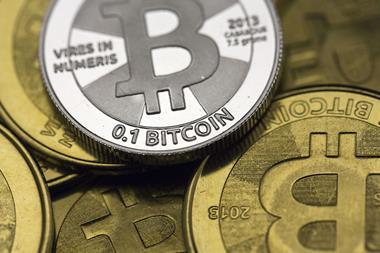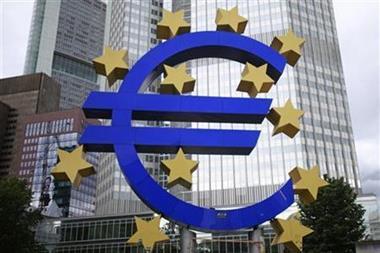While the popularity of secretive virtual currency Bitcoin continues to soar, questions remain over its market volatility, and the risks associated with its use
Over the past 12 months Bitcoin has made headlines globally with stories of crime, loss and unpredicted success. Now the virtual currency is starting to make an impression in the real business world.
Since its launch in 2009 by the pseudonymous creator(s) Satoshi Nakamoto, the value of a Bitcoin has swung, fuelled intrigue and created confusion.
In December 2013, the price of one Bitcoin was €890, which made it as valuable as an ounce (31g) of gold.
Bitcoin’s secretive and decentralised nature has attracted users of the ‘dark web’ and Bitcoin became the common currency on the infamous and now defunct Silk Road website, where users traded illegal items anonymously. Furthermore, links to organised crime have plagued its short existence, prompting arrests on charges of money laundering and theft.
On the plus side, businesses are increasingly accepting Bitcoins as payment for services and goods and the world’s venture capitalists are also backing it. So, do its advantages outweigh the disadvantages?
Bitcoin’s market volatility and security issues are obvious risks. Significant swings in value mean firms must contend with the same fluctuations as those experienced by foreign currencies – only more extreme. Even though Bitcoin reached the price of an ounce of gold in December 2013, its value halved within weeks and then increased again.
Another issue is that once a transaction has been initiated, it is irreversible. Thus, if Bitcoins are stolen from a user’s digital wallet (see overleaf) or sent to the incorrect address, it is extremely difficult to retrieve them as users can withhold identifying information from their account.
In terms of security, companies cannot insure against theft or loss of Bitcoins for various reasons, including the fact banks or other authorities do not recognise it as a currency. The high volume of Bitcoin thefts from individuals and organisations would discourage an insurer from covering the risk.
Former managing director of Deutsche Bank Guenter Droese dismisses the hype around Bitcoin and the notion that it could rival the euro, dollar or pound. “The reason why the value has increased is, more or less, that there are too many people with too much money and they don’t know where to invest their money with proper interest rates or development of value,” he says. “They are gambling. A lot of the people investing in Bitcoin are gamblers.”
According to JLT specialty partner and Global CTM Practice head Peter Hacker, Bitcoin’s potential success in rivalling traditional currencies will depend largely on its acceptance across central bank systems. Support from large economies will fuel necessary investment into Bitcoin’s reputation while the emerging economies will dictate its growth.
“For Bitcoin to gain wide acceptance and be considered safe with less value fluctuation, people need to invest into the reputation of the system and address widespread current concerns, such as misuse, to protect consumers while finding a balance between regulation and anonymity.”
Hacker believes that, with global regulations in place and value stability, insurers could collate necessary qualitative and quantitative data to underwrite and price information security (cyber) risks associated with Bitcoin.
Challenges in store
Alternative methods of Bitcoin storage to the digital wallet are now available. Convinced of Bitcoin’s promising future, Elliptic Vault has become the first organisation to offer insured storage of Bitcoins, using a technique called “deep cold storage”.
Elliptic Vault co-founder Tom Robinson says the complicated, unfamiliar nature of the cryptocurrency meant securing the backing of underwriters was tricky.
“It took a bit of time. We spoke to many underwriters and our challenge was explaining the concept and describing what the risks are and how we were going to mitigate them,” he says.
“Once we were able to do that in a clear way, we were able to secure an insurer. The risks are loss, mistakes by us or theft. We had to make clear the extent to which we were going to secure the Bitcoins until the insurers would subsidise. Our coverage denominates in pounds sterling, not in Bitcoins, because of its volatility compared with the dollar or the pound.”
Elliptic’s clients can choose their own liability limit in sterling up to £5,000 (€6,000) and pay 2% of the annual total in Bitcoins for the service.
Although Elliptic’s clients are mainly individuals looking to safeguard their Bitcoins, it has also been approached by a mixture of companies.
Robinson thinks the future looks positive for Bitcoin, particularly in the retail sector. “If you look at retailer acceptance over the past 12 months, it’s absolutely soaring,” he says.
“Overstock.com [a US online retailer] accepts it. Even our law firm is considering accepting it. I believe more and more retailers are thinking about taking it seriously.”
Overstock.com chief executive Patrick Byrne declared the company made $130,000 in sales through 840 orders from Bitcoin users in its first day of accepting the cryptocurrency. Most of these orders, he claims, were made by new customers.
To mitigate the volatility of Bitcoin and reduce exchange rate risks, Overstock.com entered into a deal with digital wallet provider Coinbase, which exchanges the virtual currency into fiat (ie legal) money as soon as the Bitcoins are received.
The major benefit to businesses in the retail industry of accepting Bitcoin payments is cutting out the traditional 3% transaction fee charged by payment providers. Coinbase, which serves about 19,000 businesses, charges a 1% transaction fee.
Garrick Hileman, economic historian at the London School of Economics, believes Bitcoin’s real potential is not as an alternative to the pound or dollar but rather as an alternative financial system.
“Coinbase and similar businesses are charging 1% in transactions fees, which is a significant saving as Visa and Mastercard are running trillions of transactions through their systems at about 3%,” he says. “There’s a saving of several hundred billion dollars that businesses and consumers could collectively realise through an alternative payment network.”
A digital currency specialist known as Crypto Evangelist believes the potential for increased profits by adopting Bitcoin is too good to ignore. “The low cost of transaction fees is already enticing businesses to implement Bitcoin payment systems into their retail models. Saving 2% on transaction fees can mean a lot in the retail environment today, where margin is everything.
“In today’s tough retail market, it’s about reducing the costs of the middleman, increasing margins and being competitive by passing on savings to the consumer.”
Support network
Although the current business opportunities for Bitcoin may seem narrow, Hileman believes powerful support from the world’s leading venture capitalists suggests the cryptocurrency will be around for a long time.
“The fact is Fred Wilson, Peter Thiel, Marc Andreessen and Jim Breyer – some of the top venture capitalists who got the world to tweet and use Facebook, and have mastered the art of changing user behaviour and driving technology adoption on a mass scale – are supporting Bitcoin in a major way,” he says.
Hileman is convinced this vote of confidence will advance the development of Bitcoin as either an alternative currency or financial system, but he acknowledges that the diversity of taxation laws around the world is making it hard to gain wider acceptance in the business world.
While most countries are deciding whether Bitcoins are deemed a currency or assets, some have banned it. In Russia, for example, trading Bitcoins is prohibited.
Droese is in no doubt as to why this is. “[Bitcoin] is artificial, and in its artificial world of finance, nobody has any real control because there is no link to direct commodities or service vendors. This is why prohibition is the only thing that works,” he says.
Considering options
In December 2013, the Chinese Central Bank restricted financial institutions from handling Bitcoin transactions although individuals can use Bitcoins.
The UK government is still considering its options, but Deloitte head of tax policy Bill Dodwell says it is unlikely to make any drastic decisions. He believes Bitcoin will continue to be regarded as an asset rather than a currency.
“I’m not sure we can expect an immediate change here. There are a lot of other issues around Bitcoin, so I’d be surprised if it were recognised as a currency,” he says. “If it were, the difference for businesses would be that gains and losses would be taxed as income rather than capital.”
The issues around Bitcoin may discourage many businesses from getting involved, but the demand for the cryptocurrency and places to spend it cannot be ignored.
One online business began to accept Bitcoins for its services in December 2013. Adult website porn.com says that by mid-January, 25% of its sales were paid for in Bitcoins. The anonymity that comes with Bitcoin transactions, rightly or wrongly, makes it perfect for adult content services, which account for a large portion of the most visited websites worldwide and for which discretion is considered paramount by users.
The current risks associated with Bitcoin will change and develop in time as governments grapple with taxation laws and cyber firms work to protect digital wallets from criminals. But Bitcoin’s valuation will ultimately determine its strength.
Crypto Evangelist believes Bitcoin has a strong future and is an inevitable consequence of the internet’s growth. “Bitcoin is a natural and much-needed innovation of the web. A decentralised global communication system such as the internet needs a decentralised global solution to payments and consensus. Criminality and corruption are created by bad actors within any system. Bitcoin’s motto is Vis in Numeris [Trust In Numbers].”
Dodwell believes Bitcoin has the potential to be considered a viable material for trade, just as gold, but tighter regulation is required if it is to be more widely adopted across the business community.
“The point about it being like gold-dealing is that there are gold smugglers, but it is quite a well-regulated business. It’s the regulation and traceability that is the key to any cryptocurrency really taking off,” he says.
Bitcoin’s supporters are optimistic. Elliptic’s Robinson says: “Offering things such as insurance and derivatives markets will help stabilise the price of Bitcoin.”
Hileman believes the meeting of the world’s top venture capitalists and technological minds is a recipe for success. “With this many smart people as passionate and as excited about it as they are, something interesting is going to happen here.”
Hacker agrees and believes future investment into Bitcoin will enhance the network and iron out its flaws. “I am absolutely convinced that we can expect to see the value grow and the investments into these networks will build a stronger platform.”
Droese remains sceptical about Bitcoin’s potential to become a major currency and believes its real value lies within criminal circles. “It is untraceable and you can make transactions across borders anonymously – all these ingredients are perfect for money laundering, which is criminal,” he says.
Nevertheless, as large organisations such as Google, Amazon and eBay start to consider how to incorporate Bitcoin into their businesses, it may be time to take the development seriously.
How does Bitcoin work?
Bitcoin is an electronic peer-to-peer payment system that services the trading of virtual currency.
Bitcoins are “mined” using expensive software to solve complex data algorithms, likened to the process of searching for new prime numbers. Systems that solve an algorithm are rewarded with a block of Bitcoins that reduces as more are released into circulation. Because algorithms are solved one at a time, the mining of Bitcoins is a competitive process.
The number of potential Bitcoins in circulation is restricted to 21 million. Currently, about 12 million are in circulation and because of the increasing difficulty of algorithms and decreasing number of Bitcoins rewarded to miners, the last Bitcoins are predicted to be released in about 2140.
Payments and transfers should be updated on the “block chain” – an integral part of the Bitcoin system, which traces every Bitcoin to prevent double-spending. Bitcoin users traditionally use digital wallets to store their Bitcoins, which use public-key cryptography.
Bitcoin supports anonymous transfers as users can withhold identifying information but each Bitcoin is tracked on the “block chain”, which keeps an account of current and past locations of each Bitcoin.
The market valuation of a single Bitcoin on exchange site MtGox rose from about €200 (£164) in November 2013 to €882 by the start of December and fell to €428 before the start of 2014.
PHOTO SOURCE: Reuters




















No comments yet